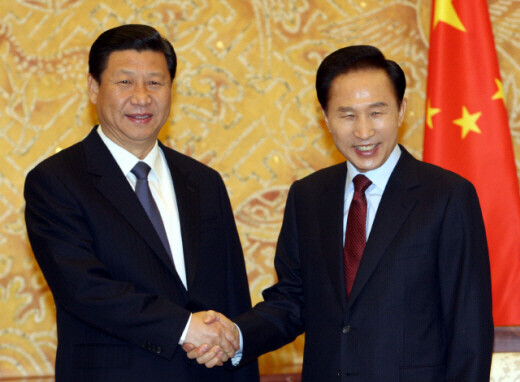hankyoreh
Links to other country sites 다른 나라 사이트 링크
China in strong pursuit of FTA with S.Korea and Northeast Asian countries

As China has been in aggressive pursuit of free trade agreements (FTAs) in Northeast Asia, it has recently made strong overtures toward South Korea.
In a meeting Thursday with South Korean President Lee Myung-bak in Seoul, Chinese Vice President Xi Jinping called for a speedy opening of discussions on a South Korea-China FTA. Vice President Xi said, “If a free trade agreement between the two countries is signed, the scale of South Korea-China trade will increase twofold by 2013.” Xi also said that signing an FTA “coincides with both countries’ interests” and expressed hopes that the two countries would work together to create the conditions for opening formal FTA negotiations.
Beginning at the fourth cross-strait talks to be held next week in Taipei, China is also set to begin negotiations in earnest on an economic cooperation framework agreement (ECFA), tantamount to an FTA with Taiwan. As of Jan. 1, a China-ASEAN FTA is to take full effect, ushering in the economic integration of China and ten Southeast Asian countries. Other plans include industry-government-academia research toward an FTA binding together South Korea, China and Japan, which account for around one-sixth of the world economy, as well as negotiations for an FTA with Australia, which is crucial in terms of securing resources.
Observers are saying China’s recent aggressive pursuit of FTAs with Northeast Asian countries appears to have the economic and strategic goal of leading an “Asian community” through the establishment of a China-centered Northeast Asian economic sphere. Shen Shishun, a senior researcher at the China Institute of International Studies, told the official news outlet China Daily on Thursday that “cooperation in Northeast Asian nations is lagging behind that of Southeast Asia, largely out of political reasons.”
Shen continued, “China, Japan and South Korea should seize the opportunity when the current Japanese ruling party is prone to Asia and is willing to forge a community in East Asia.” Shen added, “We should start building the ‘aircraft carrier’ of the East Asian Community as soon as possible.”
Some analysts are also saying that China’s aggressive approach to negotiations with economically significant South Korea is based in confidence that China has surmounted the effects of the financial crisis to some extent. Yang Pyoung-seob, head of the Beijing office of the Korea Institute for International Economic Policy, said that China is “once again pursuing in earnest FTA negotiations that were put off while it confronted the international financial crisis.” However, Yang added that it is unlikely negotiations will be easy, since an agreement with South Korea would likely involve major consideration of economic interests as well as existing diplomatic and strategic goals. In other words, while the strategic considerations of using a South Korea-China FTA as a “counterweight” to the South Korea-U.S. alliance have played a significant role to date, China is now placing importance upon economic goals as well.
The need for negotiations between South Korea and China is being emphasized by experts on South Korea-China relations and South Korean companies in China, which have felt concerned that South Korea is being left out of China’s onslaught of FTAs with Asian countries. “It is a situation where the signing of an agreement with China is urgently needed if Korean companies are to compete in the China’s domestic market,” said a South Korean scholar who has participated in discussions with China as part of a team of experts studying ways to upgrade the South Korea-China relationship.
Please direct questions or comments to [englishhani@hani.co.kr]
Editorial・opinion
![[Editorial] Does Yoon think the Korean public is wrong? [Editorial] Does Yoon think the Korean public is wrong?](https://flexible.img.hani.co.kr/flexible/normal/500/300/imgdb/original/2024/0417/8517133419684774.jpg) [Editorial] Does Yoon think the Korean public is wrong?
[Editorial] Does Yoon think the Korean public is wrong?![[Editorial] As it bolsters its alliance with US, Japan must be accountable for past [Editorial] As it bolsters its alliance with US, Japan must be accountable for past](https://flexible.img.hani.co.kr/flexible/normal/500/300/imgdb/original/2024/0417/6817133413968321.jpg) [Editorial] As it bolsters its alliance with US, Japan must be accountable for past
[Editorial] As it bolsters its alliance with US, Japan must be accountable for past- [Guest essay] Amending the Constitution is Yoon’s key to leaving office in public’s good graces
- [Editorial] 10 years on, lessons of Sewol tragedy must never be forgotten
- [Column] A death blow to Korea’s prosecutor politics
- [Correspondent’s column] The US and the end of Japanese pacifism
- [Guest essay] How Korea turned its trainee doctors into monsters
- [Guest essay] As someone who helped forge Seoul-Moscow ties, their status today troubles me
- [Editorial] Koreans sent a loud and clear message to Yoon
- [Column] In Korea’s midterm elections, it’s time for accountability
Most viewed articles
- 1[Column] The clock is ticking for Korea’s first lady
- 2Samsung barricades office as unionized workers strike for better conditions
- 3S. Korea, Japan reaffirm commitment to strengthening trilateral ties with US
- 4[Editorial] When the choice is kids or career, Korea will never overcome birth rate woes
- 5[Guest essay] How Korea turned its trainee doctors into monsters
- 6Japan officially says compensation of Korean forced laborers isn’t its responsibility
- 7[Editorial] As it bolsters its alliance with US, Japan must be accountable for past
- 8Korea, Japan jointly vow response to FX volatility as currencies tumble
- 9Gangnam murderer says he killed “because women have always ignored me”
- 10Worse than worst case: Korea’s population is shrinking faster than predicted